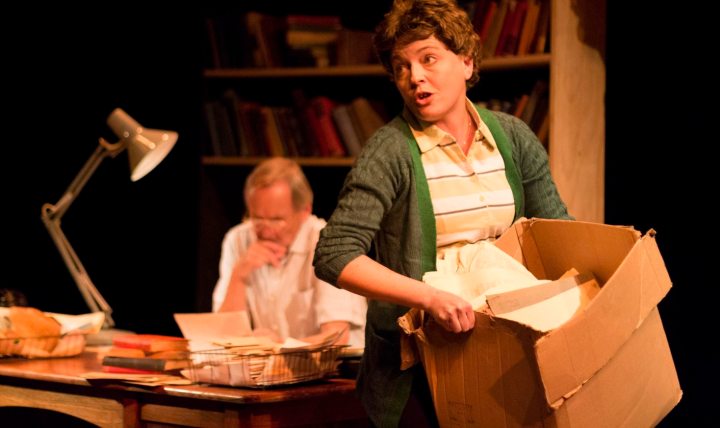Maverick Life
Theatre Review: A Voice I Cannot Silence

Any play written in tribute to an internationally renowned author demands a quality of words and richness of ideas befitting their iconic status. By LESLEY STONES.
That has been achieved in a play created to commemorate Alan Paton, because more than 90% of the script was created from the words of Paton himself by delving into the legacy of novels, verse, letters and memoirs he left behind.
A Voice I Cannot Silence begins and ends with death, but it’s neither sad nor maudlin. It’s a celebration of a life well lived, even though Paton’s character expresses doubts that he did enough to oppose the tyranny of apartheid and fight for equality for all.
He can rest in peace – he did plenty. In the words of his surviving widow Anne, Paton’s work helped to bring the suffering of South Africa to the attention of the world.
The play was co-written by Greg Homann, who also directs it, and Ralph Lawson, who also plays Paton and does it superbly. Lawson rants and raves magnificently when he’s infuriated, is suitably absentminded about the humdrum and achingly sorrowful when he speaks to his dead wife Dorrie, and raises those eternal questions of what next, where do you go? These are lump-in-the-throat moments.

A painstaking amount of work and research must have gone into creating the script, which examines Paton’s life through his own writing. That necessarily makes it an intense, word-rich production that expects the audience to pay attention. That’s easy to do, because you’re drawn right into the study where Paton works, sometimes with just a light shining on him and his desk to really focus our concentration.
Theoretically this is the stuff of heavy documentaries, but the play strikes a welcome balance between the deep meat of its material and a lightness in the moments spent with Anne Hopkins (Clare Mortimer), the secretary he employed after Dorrie’s death and who quickly became his second wife.
Mortimer wins your heart too as she plays the efficient British woman with charm and verve. The relationship between them is mesmerising. Mortimer lets us see her growing affection for Paton until we’re almost fit to prod him into making a move. But we don’t wait long until the hugely intelligent and deeply wounded man recognises the wonderful thing in front of him.
The script is peppered with wit and irony, intelligence and provocative ideas. It raises questions such as whether a person should still be punished for a crime if the victim has forgiven them. Paton – yes, of course there must be consequences. Menzi Mkhwane, playing a boy in a reform school – no, how can you take an eye for an eye when it was my eye that was injured, and I’ve forgiven him?

Mkhwane plays a series of characters that allow some events to be acted out, rather then reminisced about. The first one or two left me baffled, then I realised the characters also represent a manifestation of Paton’s conscious, finally tormenting him with his question “did I do enough?”.
Some of the most moving scenes involve his time as the principal of Diepkloof Reformatory for young black offenders, where he introduced liberal policies of trust and respect for the inmates.
One memorable scene has Lawson and Mortimer jointly speaking of a 12-year-old boy locked up for stealing, who invents a family life in his head to escape the truth of loneliness. The staging is beautiful – the two main characters speaking in hushed tones while the fragile figure of Mkhwane is framed in the background.
The play moves steadily forward through Paton’s clashes with the authorities, his founding of the Liberal Party, his hounding by the secret police and his prolific writing and speaking schedules. He infuriated the apartheid government with the reforms he made at the reformatory and the international furore his novels were creating.
The set by Nadia Cohen is ideal – a desk strewn with books, papers, letters and perhaps a whisky glass buried beneath the unruly heap. Bookshelves lined with serious looking tomes, and a step down from the circular stage that brings the characters closer to the audience.
Paton’s most famous work – and also his first – was Cry, The Beloved Country, a phrase that marched into the lexicon of political and social commentators and remains there 70 years later.
I think Paton would be proud of this latest work that his words have been used to create. DM
Tickets from the box office on 011 883 8606 or www.strictlytickets.co.za.
Photos by Sithasolwazi Kentane.



















 Become an Insider
Become an Insider